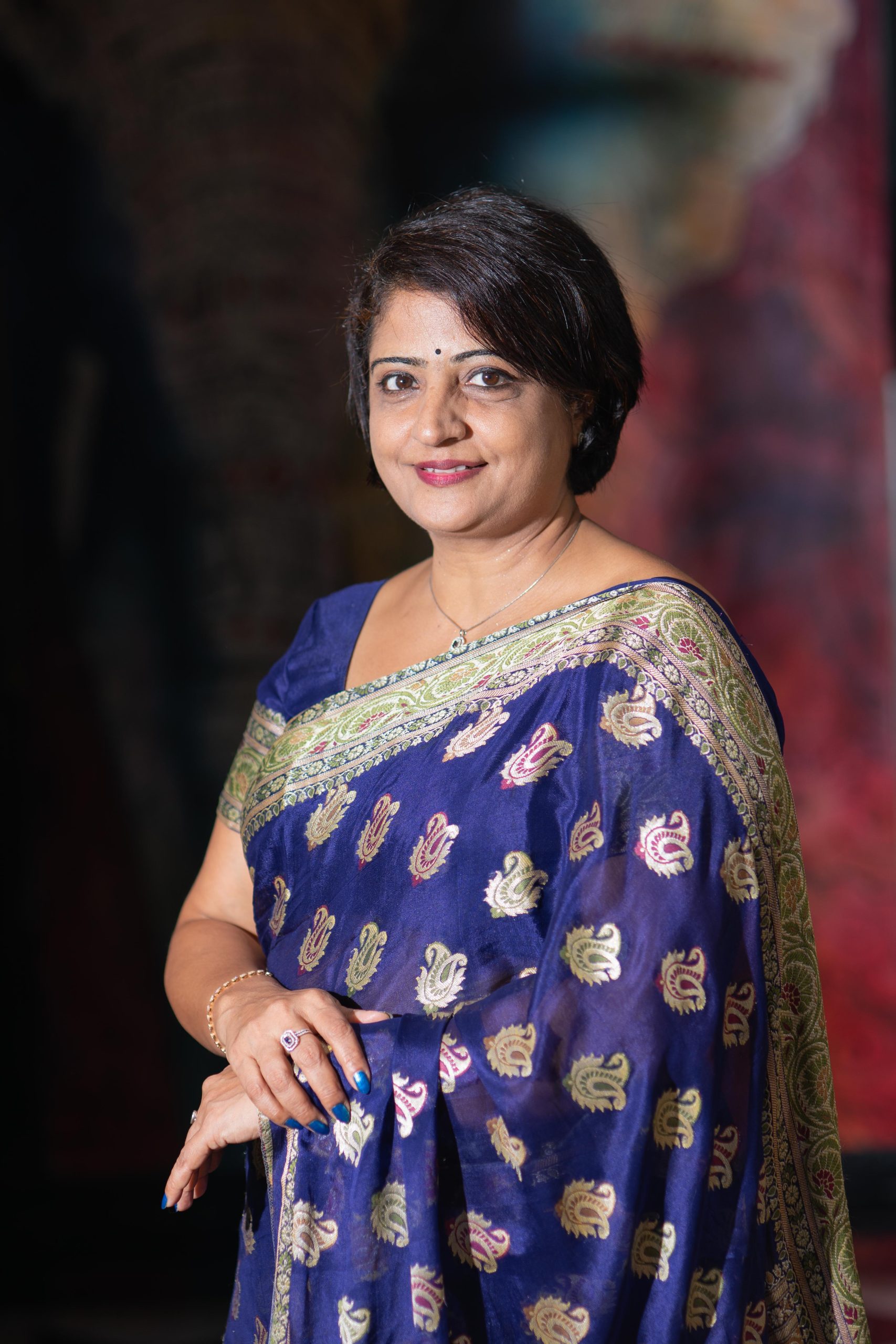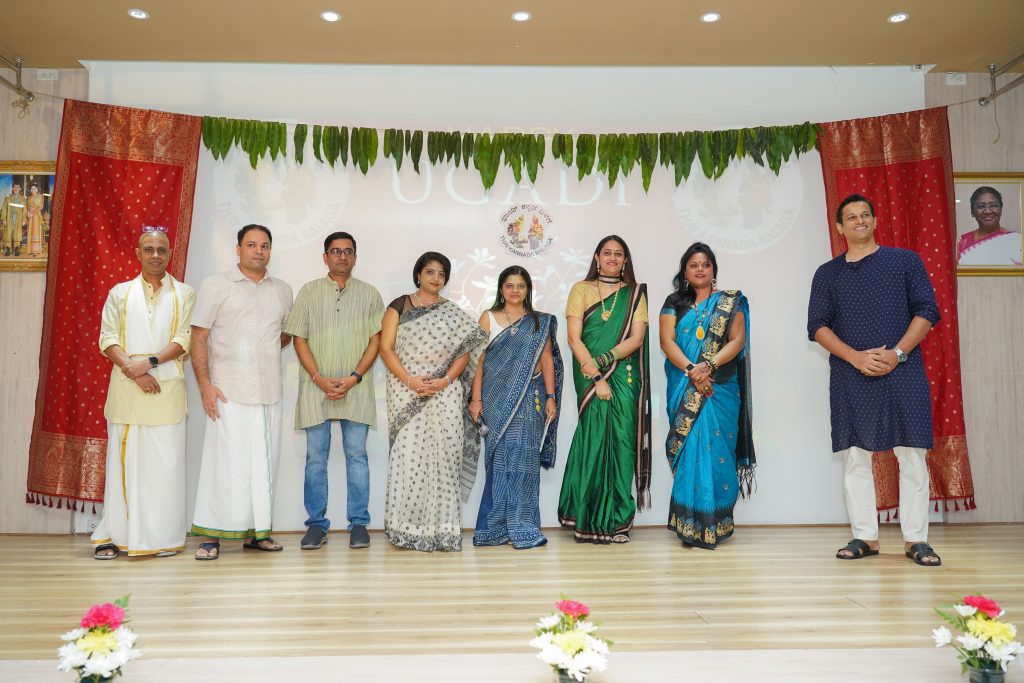She’s finding the common thread.
By Aiden Jewelle Gonzales
The diversity of the Indian community around the world, and more specifically, in Thailand, never fails to impress me. While most of the second- and third-generation Thai-Indian community may hail from Punjab, the Kingdom is rife with communities from Marwar, Gujarat, Sindh, the Northeast Indian states, the coastal and Southern states of India, and many more. Having had the privilege of interviewing people from most of these communities, I’m constantly reminded of the importance of having a virtual village that both protects and celebrates your unique culture, customs, and languages. After all, the Thai-Indian community would not be as rich a tapestry without the different threads that make it a whole.
Rashmi Ravi, the President of the Thai Kannada Balaga, is one such person who has charged herself with upholding the customs and culture of her community, while still embracing Thailand as her second home. Resplendent in a traditional sapphire-blue sari when I met her at the Rembrandt Hotel & Suites Bangkok, Rashmi greeted me with a gentle, “Namaskara yellarigu,” and immediately launches into her journey to the Kingdom from Bengaluru, which she fondly calls “the bustling IT hub in India.”
“My journey to Thailand unfolded as a chapter in the story of my life after marriage, in 1995” she tells me. “I stepped into this vibrant country as a newly-married bride, and Silom became our initial abode, where I encountered a tapestry of people from various corners and communities of India,” she says with affectionate remembrance. “The transition brought with it new experiences, cultural discoveries, and a chance to build a life in the vibrant and diverse landscape of Thailand. It’s been an exciting adventure, marked by the blending of two worlds and the creation of a home in this beautiful country. The memories we’ve created in Thailand have woven a tapestry that holds a special place in our hearts, and Thailand will forever be etched in our story as the backdrop to a life well-lived.”
Regardless, she tells me, as much as Thailand has become a home away from home, with roots running deep – from starting a family here and raising two sons, now pursuing their own careers in different parts of the world; to forging lasting connections with a circle of cherished friends – it’s near and dear to her heart to continue promoting the Kannada culture and heritage in Thailand. “The Thai Kannada Balaga fosters a sense of community among Kannada people, providing a platform for social interaction and networking,” she explains. “We organise cultural events and celebrate our major festivals to connect the community together.”
It’s those ties of love, support, and resilience that have tied her family together, and that she hopes to strengthen within the community. “Our family has realised that much like the changing seasons, our surroundings may shift, but the unwavering love and support we share remain steadfast. Transitions mark an opportunity for personal growth and the embrace of new experiences, and this is something that we hope the rest of the Kannada community who’ve moved here will experience.”
Despite a busy career, from a brief stint in a school to a 20- year tenure working in an office, Rashmi is dedicated to bring together her community and Thailand, and the Thai Kannada Balaga now boasts over 150 official members. She tells Masala more about the founding of the association, itss objectives, and how they’ve been preserving their culture for the last 20 years.
You’ve told us about how much you appreciate Thailand as a second home, but your love for Bangalore also continues to shine through. Tell us what it was like to grow up there, and the unique culture and customs there compared to the rest of India. What do you miss most about it?
Bangalore, the IT capital of India, is renowned for its captivating fusion of tradition and modernity. Bangalore possesses a unique cultural identity that distinguishes it from other regions of India, and a key element of this identity is its cosmopolitan nature. The city, propelled by the presence of IT industries, hosts a harmonious coexistence of people from various states and even different countries. This diversity is reflected in the striking array of languages spoken—while Kannada holds the official status, a melange of Hindi, English, Tamil, Telugu, and more contribute to the city’s multicultural aspect.
A noteworthy aspect of Bangalore’s charm lies in its culinary landscape. From the iconic South Indian filter coffee and masala dosa, to the vibrant street food scene, the city caters to a diverse range of taste buds. For the younger crowd, Bangalore boasts a thriving pub culture, injecting a dynamic and energetic vibe that makes it a focal point for creativity, innovation, and cultural exchange. Given this vibrant background, adapting to life in Bangkok was a seamless transition for me. The proximity of the two cities made the adjustment even more straightforward, allowing me to feel asense of familiarity and connection in my new surroundings.
Bangalore boasts the best weather, thanks to its tropical savanna climate, characterized by moderate temperatures and well-defined wet and dry seasons. What I miss the most are the cherished memories of family, the delightful weather, and the diverse array of street foods that were a constant source of joy during our school and college days. Whether it’s the familiar faces, the comforting embrace of favourite dishes, or the cultural nuances that make home truly unique, these are the aspects that linger in my fondest recollections.
I’m sure these feelings are not unique to you alone, and you thus helped found the Thai Kannada Balaga, an association to support those who are similarly craving a taste of home. Tell us a little about the association, and what its main objectives are.
In 2003, a small group of families familiar with each other came together with the idea of celebrating our festivals collectively. It began as an intimate gathering on Diwali night, and through word of mouth and friends connecting with friends, the event rapidly grew. Surprisingly, around 80 Kannada-speaking individuals joined us that day. Inspired by this turnout, we made a collective decision to formally establish the Thai Kannada Balaga, marking the commencement of our journey, which continues to thrive.
Officially founded in 2003, the Thai Kannada Balaga had Ravi Mysore Balasubramanyam as its inaugural President, leading the way with his team. Since then, the tradition has been to elect a fresh team every two years, with each new member assuming responsibility for the committee during their term. This system ensures a constant influx of ideas and perspectives, contributing to the dynamic growth of our community.
Our primary objective, as a community, is to propagate the richness of our art and culture. We are committed to ensuring that younger generations are well-versed in the cultural and linguistic heritage of Kannada, fostering a strong connection to their roots. Through the Thai Kannada Balaga, we strive to create a platform where the essence of Kannada culture is not only preserved, but also passed on to future generations.
What is your vision for how the society will support and promote the cultural heritage of the South Indian communities, and specifically the community from Kannada, in Thailand?
Our vision is to create a dynamic and inclusive society in Thailand that wholeheartedly supports and promotes the rich cultural heritage of Karnataka. We aspire to build a community where every individual, regardless of background, feels a strong sense of pride in their Kannada roots and actively contributes to the preservation and propagation of our cultural legacy. Recently, we initiated the International Cultural Festival in Bangkok, in association with the Thai Telugu Association and Thailand Tamil Federation. It was a huge success, during which the different art forms of India were showcased; a true celebration of culture and unity. We also showcased Thai dance forms, which helped foster cross-cultural understanding.
What are some other major events or initiatives you foresee, and how do these collaboration with other Indian community organisations address the needs of the Kannada community?
We celebrate major events throughout the year, including Ugadi, our new year, Deepawali, and Kannada Rajyotsava. During these celebrations, we bring together various artists from Karnataka to immerse ourselves in our traditional festive customs. All 150 of our members residing in Thailand actively participate in these joyous occasions. In addition to our cultural festivities, we are currently in the planning stages of a collaborative sports day with other associations. This event aims to foster connections and understanding among people from different communities, creating a cross-cultural experience that goes beyond our traditional celebrations. The goal is to expand our network and strengthen the sense of community among diverse groups within Thailand.
Collaboration with other Indian community organisations and the Embassy of India in Bangkok can be instrumental in addressing the needs and concerns of the community. We actively participate in forums under the umbrella of organisations that bring together various Indian community groups, which in turn allows for shared
resources, information, and collective advocacy, and allows us to organise joint cultural events, festivals, or celebrations. This could involve programmes that showcase the diversity of Indian traditions, as well as inter-community sports leagues or recreational activities with other Indian communities and with the local Thai community. This not only fosters a sense of unity but also promotes cross-cultural understanding, and allows us to build strong bonds, both with other Indian communities, as well as the local Thai people.
As a woman and a mother who’s lived in both Bangalore and Thailand for many years, you bring idiosyncratic strengths to your role as President of the Thai Kannada Balaga. What do you believe are some of the unique advantages you bring to the table, and what is your vision for the future?
The role of the association president is quite a responsibility! Our committee team members play a crucial role in ensuring everything is executed seamlessly, with each member contributing equally to the success of the event. I’ve found that women tend to communicate more effortlessly, making our journey thus far remarkably smooth. One of the most inspiring aspects for me has been witnessing the vibrant cultural tapestry of the Kannada community in Thailand and recognising the potential for a positive impact on its members. It’s particularly heartening to see the younger generation enthusiastically embracing their roots and cultural traditions, ensuring the continuity of our heritage.
My vision for the association encompasses creating an inclusive community where every member feels a deep sense of belonging. Irrespective of age, background, or the duration of one’s stay in Thailand, I want everyone to find a home within our association. Empowering each member to actively shape the future of our Kannada community in Thailand is a key part of this vision. As we proudly celebrate our 20th Anniversary this year, I hope that this milestone is just the beginning of many more years to come.








